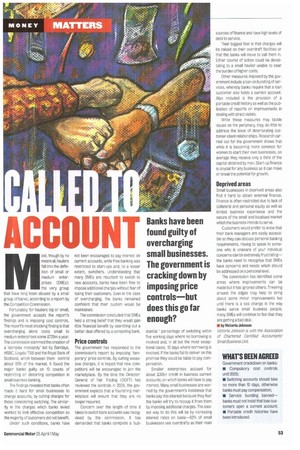ACCOU
Page 53

If you've noticed an error in this article please click here to report it so we can fix it.
Mil ost, though by no means all, hauliers fall into the definition of small or medium enterprises (SMEs): the very group that have long been abused by a small group of banks, according to a report by the Competition Commission.
Fortunately for hauliers big or small, the government accepts the report's findings and is imposing cost controls. The report's most shocking finding is that overcharging alone costs small to medium enterprises some £725m a year. The commission slammed the creation of a 'complex monopoly' led by Barclays, I-ISBC, Lioyds/TS8 and the Royal Bank of Scotland, which between them control about 85% of the market. It found the major banks guilty on 10 counts of restricting or distortirg competition in small business banking.
The findings revealed that banks often made it hard for small businesses to change accounts, by cutting charges for those considering switching. The similarity in the charges which banks levied worked to limit effective competition so the majority of customers did not benefit.
Under such conditions, banks have not been encouraged to pay interest on current accounts, while free banking was restricted to start-ups and, to a Lesser extent, switchers. Understanding that many SMEs are reluctant to switch to new accounts, banks have been free to impose additional charges without fear of losing their customers. Even in the case of overcharging, the banks remained confident that their custom would be maintained.
The commission concluded that SMEs held a strong belief that they would gain little financial benefit by searching out a better deal offered by a competing bank.
Price controls
The government has responded to the commission's report by imposing 'temporary' price controls. By cutting excessive charges, it is hoped that new competitors will be encouraged to join the marketplace. By the time the DirectorGeneral of Fair Trading (DGFT) has reviewed the controls in 2005, the government expects that a flourishing marketplace will ensure that they are no longer required.
Concern over the length of time it takes to switch bank accounts was recognised by the commission. it has demanded that banks complete a 'sub stantial 'percentage of switching within five working days where no borrowing is involved and, in all but the most exceptional cases, 10 days where borrowing is involved. If the banks fail to deliver on this promise they could be liable to pay compensation.
Smaller enterprises account for about .£30bn credit in business current accounts, on which banks will have to pay interest. Many small businesses are worried by the government's insistence that banks pay this interest because they fear the banks will try to recoup it from them by imposing additional charges. The easiest way to do this will be by increasing interest rates on loans-62% of small businesses use overdrafts as their main sources of finance and have high levels of debt to service.
Their biggest fear is that charges will be raised on their overdraft facilities or that the banks will move to call them in. Either course of action could be devastating to a small haulier unable to Dear the burden of higher costs.
Other measures imposed by the government include a ban on bundling of services, whereby banks require that a loan customer also holds a current account. Also included is the provision of a portable credit history as well as the publication of reports on improvements in dealing with direct debits.
While these measures may tackle issues on the periphery, they do little to address the issue of deteriorating customer-client relationships. Research carried out for the government shows that while it is becoming more common for women to start their own businesses, on average they receive only a third of the capital obtained by men. Start-up finance is crucial for any business as it can make or break the potential for growth.
Deprived areas
Small businesses in deprived areas also find it hard to obtain external finance. Finance is often restricted due to lack of collateral and personal equity as well as limited business experience and the nature of the small and localised market which the business intends to serve.
Customers would prefer to know that their bank managers are easily accessble so they can discuss personal banking requirements. Having to speak to someone who is unaware of your individual concerns can be extremely frustrating— the banks need to recognise that SMEs have concerns and needs which should be addressed on a personal level, The commission has identified some areas where improvements can be made but it has ignored others. Tnkering around the edges may help to bring about some minor improvements but until there is a sea change in the way banks serve small business people, many SMEs will continue to feel that they are getting a bad deal.
• by Victoria Johnson
Victoria Johnson is with the Association of Chartered Certified Accountants' Small Business Unit.












































































































































































